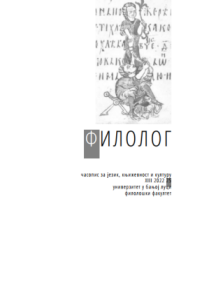УНУТРАШЊА И СПОЉАШЊА МОТИВАЦИЈА У УЧЕЊУ ЕНГЛЕСКОГ ЈЕЗИКА КАО СТРАНОГ НА УНИВЕРЗИТЕТСКОM НИВОУ
INTRINSIC AND EXTRINSIC MOTIVATION IN EFL LEARNING AT UNIVERSITY LEVEL
Author(s): Danijela M. Prošić Santovac, Ana Halas PopovićSubject(s): Language studies, Language and Literature Studies, Foreign languages learning, Higher Education
Published by: Филолошки факултет Универзитета у Бањој Луци
Keywords: Self-Determination Theory; intrinsic motivation; extrinsic motivation; foreign language; English language;
Summary/Abstract: Whether learners are motivated or not and, if they are motivated, whether their motivation is intrinsic or extrinsic is an important factor influencing the outcome of learning a foreign language. This paper examines the intrinsic and extrinsic motivation of students learning English as a foreign language at B1 level according to The Common European Framework of Reference for Languages (CEFR). The theoretical background of the research set forth in this paper does not rely only on the aforementioned dichotomy but it is also based on a more detailed classification of extrinsic motivation by Ryan and Deci (2000) into four types (external regulation, introjected regulation, regulation through identification, integrated regulation) as well as the tripartite classification of intrinsic motivation by Vallerand et al. (1992) (intrinsic motivation to know, intrinsic motivation toward accomplishments, intrinsic motivation to experience stimulation). The aim of the research was to gain insight into the most significant factors influencing motivation of the aforementioned students, the type of motivation which is the strongest driving force in these students’ learning of English and the relation between different types of motivation and the students’ gender, regular class attendance, voluntary participation in an extra written assignment and the total average grade obtained throughout the entire academic year. The sample for the research included 145 students at the Faculty of Philosophy, University of Novi Sad enrolled on 14 different study programmes. A quantitative approach to data collection was used through a questionnaire with closed-ended questions. The research results based on the statistical analysis of the collected data showed that the most important factor influencing motivation for EFL learning is the teachers’ behaviour and rapport with their students. In the examined sample, the most prominent type of motivation was an external one or, more specifically, regulation through identification and integrated regulation. A statistically significant difference was noticed in the case of participants’ gender as a variable in this research, especially taking into account intrinsic motivation to know and experience stimulation. Students’ irregular class attendance and decision not to participate in an extra written assignment were related to their lack of motivation. Furthermore, the degree of students’ motivation and their total average grade were in direct proportion. Finally, it was concluded that the participants perceived motivation as a significant outcome of EFL teaching.
Journal: Филолог – часопис за језик, књижевност и културу
- Issue Year: 13/2022
- Issue No: 25
- Page Range: 86-114
- Page Count: 29
- Language: Serbian

